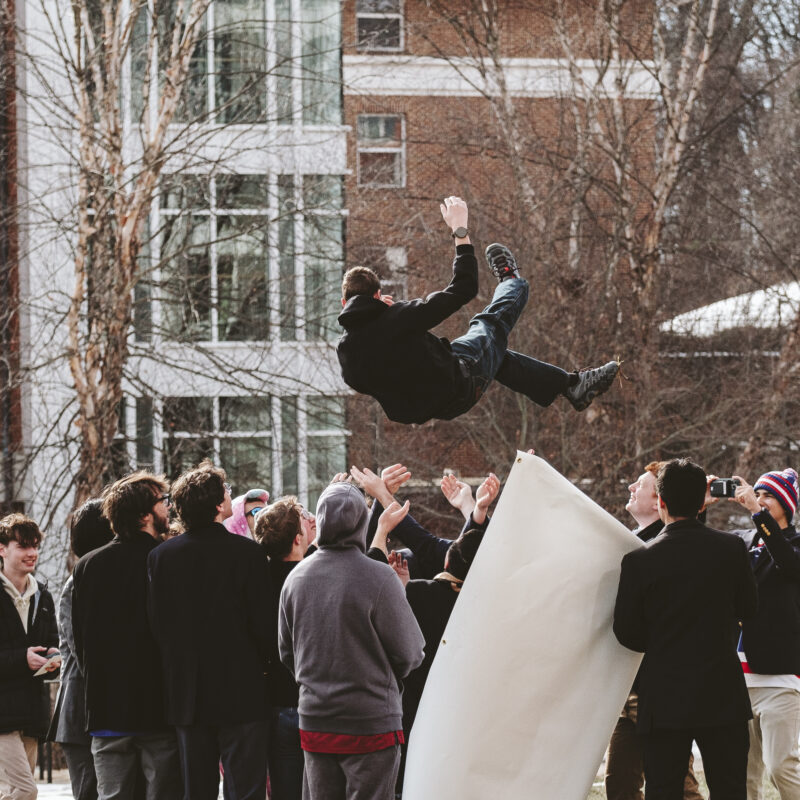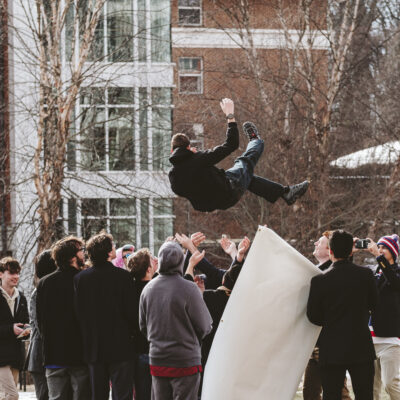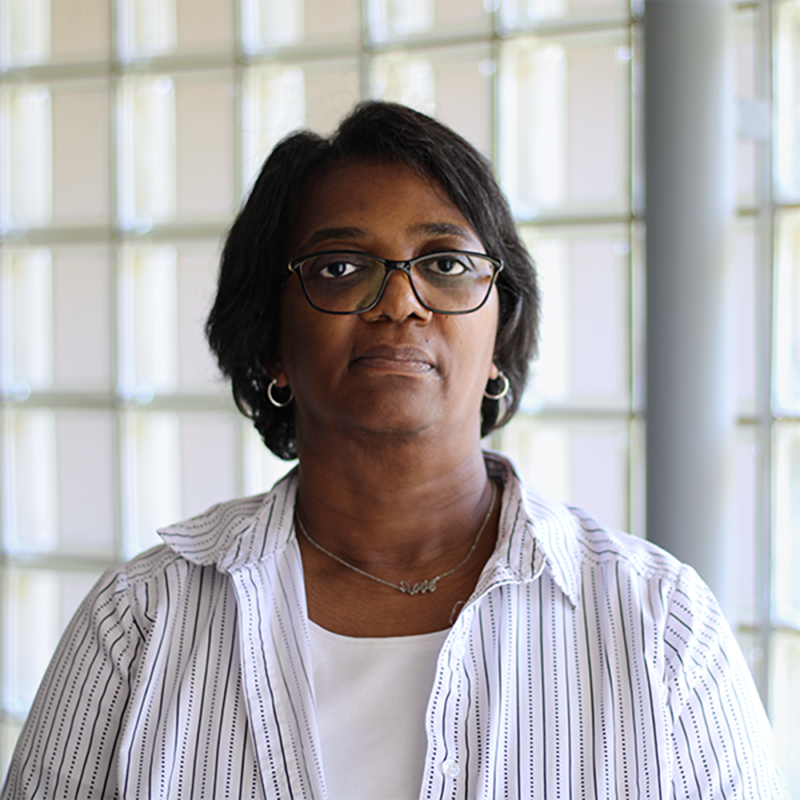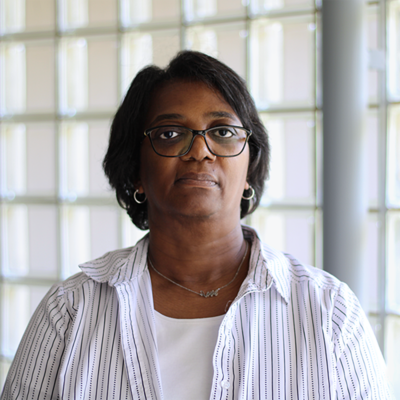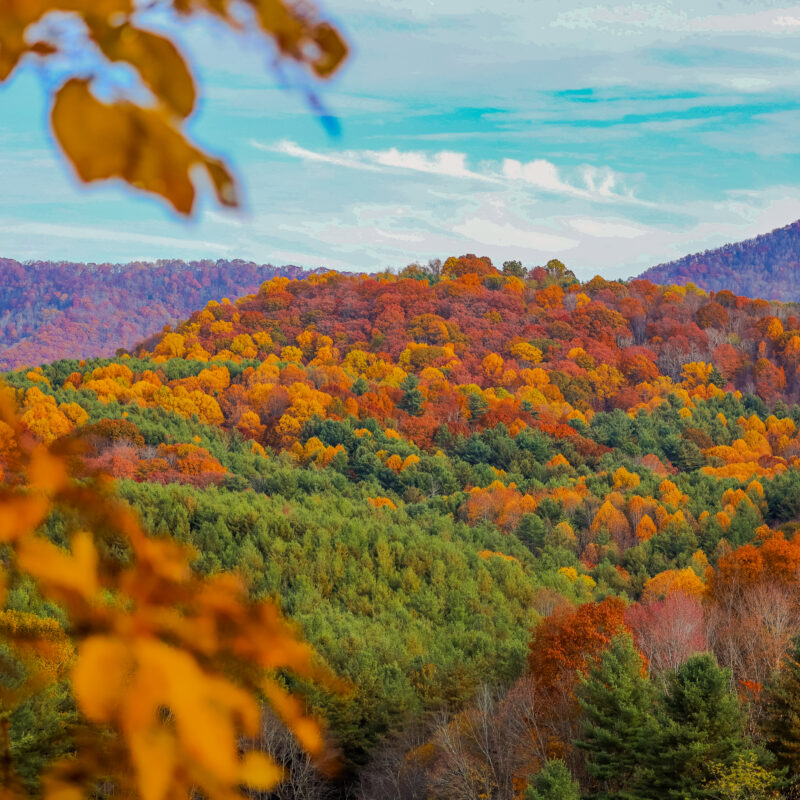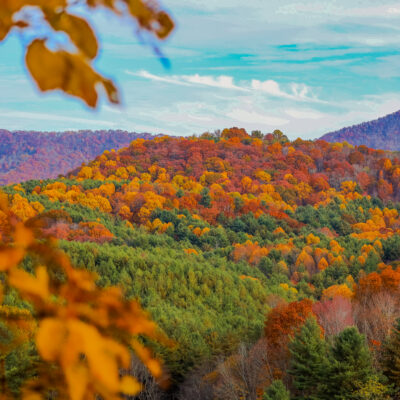
When Dave Matthews finally telephones from the West Coast, he’s 30 minutes late. And full of apologies. “On the rare occasion that I can say it had nothing to do with me I will claim complete innocence,” he says, placing guilt elsewhere. “I hate being late. It makes me sick.”
Generally speaking, timing has not been a big problem for Matthews and his four bandmates in the Dave Matthews Band. For the past 15 years, like clockwork, they’ve gotten their act together and taken it on the road. As their fame grows, and record sales climb (over 30 million sold to date), their summer festival gigs and charity concerts have become a summer mainstay. It’s a long way from the dinky surroundings of Trax, the erstwhile Charlottesville nightclub where they played every Tuesday night at the start of the ’90s.
In fact, so high has the demand been across the country for some DM time that it’s been more than five years since the band played live in Charlottesville (their influence is felt in other ways, notably the local philanthropy of Bama Works, their charity fund). That changes on Friday and Saturday, September 22 and 23, when they close out this summer’s tour with performances at UVA’s John Paul Jones Arena. This conversation with Dave Matthews took place a couple of weeks prior to the show.
Cathy Harding: From what I understand, today is LeRoi’s birthday.
Dave Matthews: Yes it is, I haven’t seen him yet… I’ve only been awake for a couple of hours.
Are you going to give him something?
I probably will say happy birthday.
Sing the song, maybe?
I don’t know if I’m going to sing the song. I think he’s probably heard that before.
Is it hard to be on tour and have those kinds of personal events take place? Birthdays, wedding anniversaries or whatever.
It’s not an unusual life or situation for us to be on the road. I wouldn’t know what an anniversary is like other than on the road, and I wouldn’t know what my children’s birthdays are like other than at least close to on the road. I haven’t had a birthday in, you know, 16 years that hasn’t been close to being on the road or on the road.
I think we are very fortunate to have a remarkable group of people that travel with us that sort of hovers around 50. It’s unusual because it’s such a superb collection of people that I can’t imagine that every touring organization could have this or else the world would be named “Shangri La.” I’m sure I get treated a little bit more sweetly than some of the people on my crew, but overall I think we’ve got a pretty exceptional group of characters out here, and I can certainly think of worse places to spend my birthday—alone in a stinky apartment in Queens might be more depressing—than out on the road with a traveling circus.
Dave Matthews Band is playing two nights here for the first time in more than five years, and I’m interested in your perspective on how the city has changed in that time, let alone since the time when the band was playing Trax every Tuesday night. Your thoughts on that?
Someone connected the timeline between the success of the band and the changing face of Charlottesville, but I think that it may have been “Good Morning America” and USA Today saying it’s the nicest place to live and raise a family in America. I think that may have had something to do with it too. What happens is people find gems and in this day and age of information moving at the speed of light or the speed of our fingertips—the speed of thought—it’s hard to keep a secret. It’s very difficult to keep a place like Charlottesville a secret. I think the best we can do is try and make the evolution of community, you know, specifically Charlottesville, make it as bearable as possible, because to stop things is impossible.
I remember when they were putting the road across the Downtown Mall years ago, wasn’t that many years ago, but I remember someone saying to me, “Sign this petition to stop the road from going across the Downtown Mall.” Now I know there are people that are sentimental about things, but I thought—and I’d worked there at Miller’s for years before that and the Downtown Mall was sleepy at best, at very best. You know, it was a place where people who’d recently gotten a sabbatical from Western State and a couple of people who were looking for a drink could go and walk and everyone else couldn’t have anything to do with it. It was a shadowy spot.
And so the idea of a road that would at least alert somebody, some passersby, that there was in fact a place there to go and walk I think was not a bad idea.
And then we should also remember that in the ’70s, before they paved that with brick, that was sort of the center of the black community in Charlottesville and then they changed it. I guess the town thought it was better to turn it into a community center and really did a quite environmental relocation of a very central part of Charlottesville’s community. So I think there’s been a lot of changes in the last 30 years, 40 years in Charlottesville that we could talk about.
We always miss what’s gone, but to see the Downtown Mall bustling, I don’t think it’s a bad thing. I think it’s kind of a good thing to see it being a place where you can go out and see a lot of people. One of the things that’s being lost in a lot of the American landscape is the pedestrian walkway, so when you drive around the Corner and you see all the students or you go Downtown and you see the amount of people that are walking around, there is a sense of this beautiful evolution—at least something alive. When things change there’s an uncertainty about it, so I think the best we can do is try and make it as a—keep it as sort of beautiful as possible, those changes.
On the subject of change, you and the band were involved in the Vote for Change concerts and have been outspoken politically. You did the ad for The Nation recently, you’re on the board with Farm Aid. Do you expect to get involved in the midterm elections that are coming up?
You know, I’m hopeful for the next election, though I think it’s remarkable, in general across the country, how poorly the Democratic Party has squandered an opportunity. To call it a political party at this point, in the national landscape, is sort of almost comical to me. I think there are some very strong characters in both parties but they’re sort of overshadowed by just a shambles on both sides of the aisle.
But I haven’t even for the midterm elections or for the next elections thought of anyone that I would have thrown myself behind. I have a few ideas—I just hope that they’ll become a little more clear and I think there is a little bit of time. I know where my political allegiances lie, at least philosophically, and I’ll see how much I can compromise as little as possible before I throw my name behind anybody else.
On a political level in this country I think we’re in a deep crisis. Maybe the façade has to shatter completely before people will get off their asses and actually realize that there is a responsibility to democracy besides just having a flag on your front lawn.
The lack of deb
ate in the state and federal government is just, it’s just, I can’t even, I don’t even know how to talk about it. It just amazes me that nobody raises their hand and says, “Wait a second.” Not only are we doing nothing for our own people, but we’re doing nothing for the world. I was watching this wonderful documentary on Paul Wellstone and thinking whether you’re Left or Right, to see somebody with such remarkable character stand so clearly on what they believe without flaw and without political ambition, it’s almost unheard of nowadays.
Well, to change gears a little bit and talk about changes in another area, specifically the music industry…with increased consolidation of businesses, vertical integration, declining record sales, it seems like the barriers to entry are so much higher now for young bands than they were even 15 years ago when you guys started out. Would you agree?
Well, maybe but I also think that it’s changing: I don’t think that the record industry has got 10 years.
The band is doing this Live Trax series, which seems to be in part about different distribution channels than a record label, for instance.
We have to, contractually and otherwise, I guess at this point it’s almost “pay our respects to the record industry,” because maybe there are going to be some areas that it will survive. It will still have a purpose but to a large degree I think it’s going to be obsolete. So for us it’s just sort of trying to think of ways to stay viable in new stages, which I think are much more small and efficient musical productions. I’m glad the music that I’m interested in playing after I write it is live. I like to play in front of an audience so that one element is the one thing that we’ve always sort of had control of and that we can keep control of.
It is a very different environment but everything goes in waves. Music is obviously not going to vanish and requires new bands. There has to be music coming out of young people all of the time; that’s one of the essential parts of being a person, or being people, is that we create songs. There’s no stopping that. It may be a challenge but I think the people most fit for the job are young musicians. So I think they’re going to, and they won’t have a problem with it: “Make a video and we can put it online, we can make a song and put it online.” In a way it’s like a dream come true for young musicians, it may not have a big payment up front, get some giant record deal but in a way if you want to play music in front of people it’s a pretty good and efficient way of advertising yourself.
There may be some growing pains but I think it’s just a revolution.
The whole DMB catalog is on iTunes now. Do you have an iPod?
Yeah, but, you know, I’m incredibly boring. I don’t listen to a lot of music.
I’d rather listen to the silence.
So do you have a lot of silence on your iPod?
I have a lot of silence in my head.
I think the iPod’s amazing. There are a lot of critics on it but I haven’t taken a position on any of that stuff. I think it’s phenomenal to be able to take my CDs and pour them onto my computer. Then I go through phases, “oh I’ve got a spare hour” and I’m just sitting throwing money into my, into iTunes just because I can. It’s pretty amazing.
What do your daughters like to listen to?
I try and play them good music. They like The Beatles a lot. That’s, I guess, a standard thing.
They like Bob Marley a lot, which I think is pretty good. They like Led Zeppelin. I’ve been playing a lot of Led Zeppelin for them. They’re 5 years old they’re not at a point where they’re going to the record store by themselves. Got a Kool and the Gang Greatest Hits that they’re listening to a lot, too.
On the subject of records, will you be going back into the studio with Mark Batson after the band finishes the tour?
Yeah, I think so because we were hanging out with him in the studio before we went on tour and he’s a good friend. We’ve been playing some new music on the road and we hung out a little bit in Los Angeles when we were playing down there and he heard some new stuff. So yeah, our plan is to get together with him. The last record we made we all had a great time, but, you know, it was really fast. It was a really new experience, it was refreshing, but it was really quick. So this time looking forward to being able to stretch a little more with him in the studio and combine the writing and the playing a little more than we had the opportunity to last time because there’s no deadline. I think the last thing on earth that RCA wants us to do is to come up with a new record.
You mean right after the “greatest hits” comes out?
Yeah, whatever, and that’s another thing. That’s just something in our contract. In this time of music flying digitally around the world, record companies begin in some ways, at least for us, to represent a ball and chain as much as they do… Needless to say there’s no deadline to make a record. So we’ll take our sweet time, but probably come up with one faster than they want us to.
So what’s it been like playing on the road and having Robert Randolph sitting in?
We’ve known him for a good while. It’s fun to have someone that shares a love of playing live that we do. We’re all different characters but from the school of, if there is one, a school of music just that being truthful and playing what you mean as best as you can. It’s great to find people that believe that and that live that way.
Last question. As a much younger man, Mick Jagger famously said he didn’t want to sing “Satisfaction” when he was 40. Are there any songs that you think you would shelve as you get to be that age?
But wait, he’s still singing it.
But maybe he didn’t sing it when he was 40, you know.
He just skipped it that one year.
I’m not sure that there’s any songs that I plan to shelve before next year, specifically because of the decade but I hope that I can for as long as possible write music that somebody will like to listen to. If they want to listen to music that I wrote 15 years ago I don’t mind that. I just hope that I’m not empty of imagination to the point that I can’t come up with anything that people want to listen to now.
|
The once and future fan
A DMB fan before we even knew what to call ourselves, I meet a couple of new teen fans and wonder, where did my passion for this band go
|
|||
| BY J. TOBIAS BEARD | |||
| I didn’t want to like the Dave Matthews Band. In fact I tried hard not to. It was late 1991, I was 16 and a friend of mine told me about a friend of hers, Stefan, who went to Tandem and was in this band and we should seriously go see them. Right. Like I was going to go see a high school band. I already had a favorite local band, Indecision, and they were good, at least good enough to shuffle your feet to while holding a beer and looking around to see if anyone was laughing at you. But then someone else told me that I really had to go see this band, and so I did, early in 1992, at Trax, and that was the end of my interest in any other local music. It was the beginning of my love affair with the Dave Matthews Band, a love affair that would last for three intense and crazy years before it almost, but not quite, faded away. It seems now that there are no traces left of the old Dave Matthews Band, and yet, DMB is everywhere. Simon Evans is a skinny 15-year-old with shaggy hair that threatens to be long. When we meet, he is wearing a gray-ish shirt, cargo shorts, and what look like familiar Birkenstock-style sandals. He basically looks just like me at 15. I find this oddly refreshing. When I meet him he is six days away from becoming a freshman at Albemarle High School. We talk in a quiet practice room at the Music Resource Center, an old church whose basement has been turned into a place for kids to learn, play, and record music. Simon leans back in his chair comfortably, but his hands move a lot when he talks. He seems eager. “Every time I listen to ‘em,” he says, “I get, like, a really…it’s a good feeling, but it’s kind of eerie to know they’re from here. But then you hear their songs, their music, and it’s so good it’s, like, you just want to keep on listening. That’s why, like, once I heard one song I’d go buy a couple albums. One leads to another, and then you just get hooked on Dave Matthews.” Simon, like most people at his age, is awkward and vague. He’s fumbling towards adulthood faster than he seems to realize. He is also confident and savvy and enthusiastic about his life right now in a way that’s unfamiliar to me and that bodes well for his life 10 years from now. He plays bass in a band called the Deltas. Last month they played their first gig at Starr Hill. Getting to do so was the second-place prize in a battle of the bands at the Music Resource Center. The MRC seems to be the Deltas’ second home, and they are currently recording their first album there. Simon has never seen the Dave Matthews Band live, except on a TV screen. On September 24, 2003, DMB played for a crowd of almost 100,000 people on the Great Lawn of Central Park. It was and still is the largest crowd they have ever played for. The Central Park concert marked the moment when everyone, the band included, realized just how big they had become. “When I was first getting into them,” Simon tells me, ”before I bought the iTunes albums I went on Netflix and rented the Central Park concert. And so seeing them live…me and my mom were just blown away, we were just like WOW, you know?” Simon fell for the band at the exact point when they were as far away from their beginning as they could possibly be. I find this mildly upsetting; to him it doesn’t seem to matter much. It has been 12 years since I last saw the band, and maybe 10 since I stopped listening to them. When I listen to the Central Park concert it’s exciting and unsettling in equal measures. I realize I have locked the band in a time capsule; they cannot mean anything but what they had once meant to me. And what was that exactly? Strangely, I don’t know anymore. It is almost a shock to find that the band still sounds good. I even like some of the new songs. I wish I could somehow let Simon hear what they used to be like, to see if his reaction to the past is different from my reaction to the present. I ask him if he has ever heard any old bootleg tapes of the band and he says no, not really, but: SE: Actually I saw [DMB], I don’t know whether it was at a festival, I must have been looking at like some video online or something, and it was, like, back in ‘92, I think, and it was just really cool seeing them, like, before they got big. You know, you see them, everybody’s havin’ a picnic, everyone’s just being calm… April 5, 1992. Van Ryper’s Music Festival, in Nelson County, outside of Charlottesville. There is a frightening number of Baja Jackets and everyone seems to have long hair. DMB plays on the rough wooden stage under budding trees. The field of people stretches back to the roped-off section on a hill where those who want to drink are sequestered, lonely and far from the action. I was there and I danced. I had a tape of that show. I was an early and serious taper, lugging a tape deck to the shows at Trax, which the soundman, Jeff “Bagby” Thomas would patch into the soundboard. I had no idea then what a privilege that was. After all, Bagby was just a kid like us: he drove me to school every morning. Those meticulously labeled and catalogued live tapes, hauled around in two suitcases, were more valuable to me than any I had bought in a store. The best tapes I had were the ones that were unmistakably Charlottesville: The first four-song demo that Dave made before he got a band, a two-hour WTJU show that Dave and Tim Reynolds did (they sound extremely stoned), and a badly recorded and unlabeled tape that was rumored to have been made by Dave himself as a Christmas present for his friends and family. This last one may have been a complete fake, but I was an obsessive fan—before websites and discussion boards. All I had was the whispered fog of rumors, and I milked them for all they were worth. Lyle Begiebing is also a 15-year-old Dave Matthews Band fan. I meet him and Simon on another day at the Omni where we talk over iced tea and Cokes. Lyle was born here, and unlike Simon, he has seen the band twice. His parents went to UVA and used to go see the band on some of those early, electric nights. Lyle is a drummer, and in concert he mostly watches Carter Beauford. “[Carter]’s the best around. I play along to the albums but it’s impossible to do everything he does. I’m trying to learn how to play the same style, like, open: He doesn’t cross [his arms] when he plays.” Lyle has pier Trax is gone now. DMB was last there in 1996. The club closed in June 2001, and was torn down in 2003. There is now no trace of Dave left at 120 11th St. The titular railroad tracks are still there, of course, and the parking lot, site of much furtive and clandestine activity is still there, but that’s it. Where Trax used to be there now squats the gloriously named UVA Hospital Expansion Project Field Office. It’s a grey trailer lined in front with air conditioning units. Like Dorothy’s house in The Wizard of Oz, this nondescript building crushes my youth. It is all vacant lot, boxcar, loading dock and industrial trash, set to the soft hum of machinery. No trace of Dave and no music. With Simon and Lyle on my mind, I go to stare at the pink warehouse, the legendary building on South and First streets where Dave wrote the original set of DMB songs. What do I hope to find there? This building meant nothing to me when I was young. The Charlottesville I grew up in was the Charlottesville where the band was born, and I guess I’m looking for some way to get back to that time, that sense of beginnings. About six years ago I gave all of my DMB bootlegs to a 16-year-old fan in North Carolina. Suddenly I miss those tapes. I download some of DMB’s new music and all of the old stuff. I drive around Charlottesville playing Dave Matthews Band. I now find this fairly embarrassing. I try and will myself back to the time before the band’s website had more hats for sale than studio albums. Before the Dave Matthews Band became the Dave Matthews Brand. Before Dave’s voice began to sound pained, like his throat was filling up with blood. Before I became so cynical. JTB: Have you ever seen them around town? PQ I don’t know who all of them were, the first young Dave Matthews Band fans, except in the ways that they were probably roughly like me. We skewed towards Albemarle County Hippie; those middle- to upper-class kids who were the first spawn of the Baby Boomers, who wore Duckhead khakis with boutique tie-dyes, and drove Jeep Wagoneers to Dead shows. It was the Dawning of the Age of Equestrious.
|
|||
